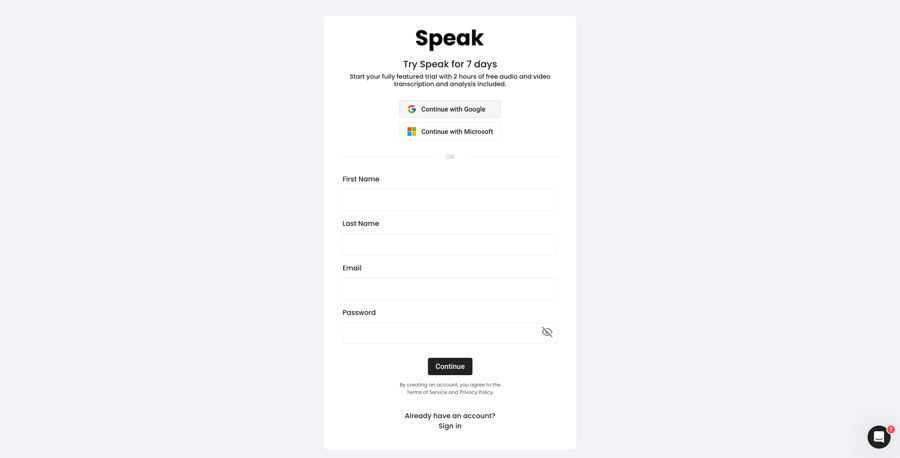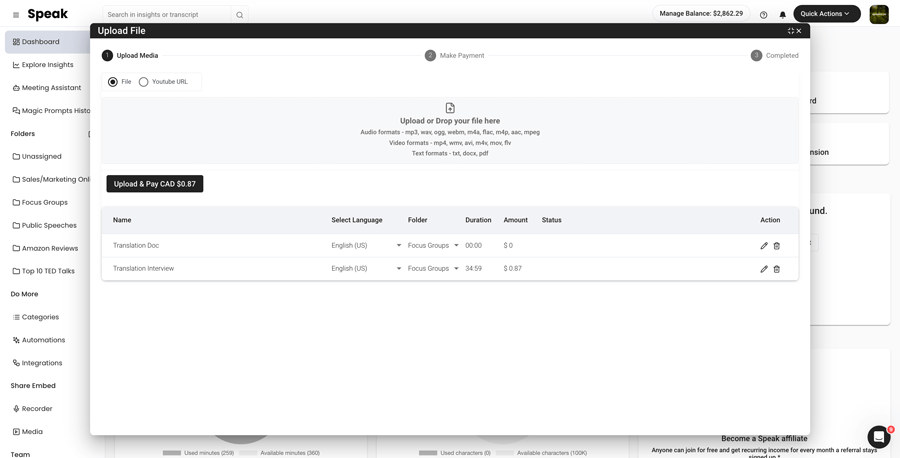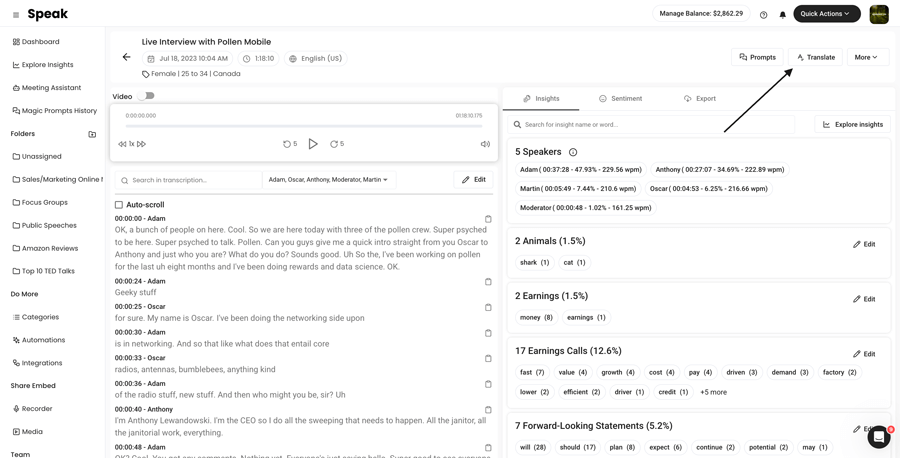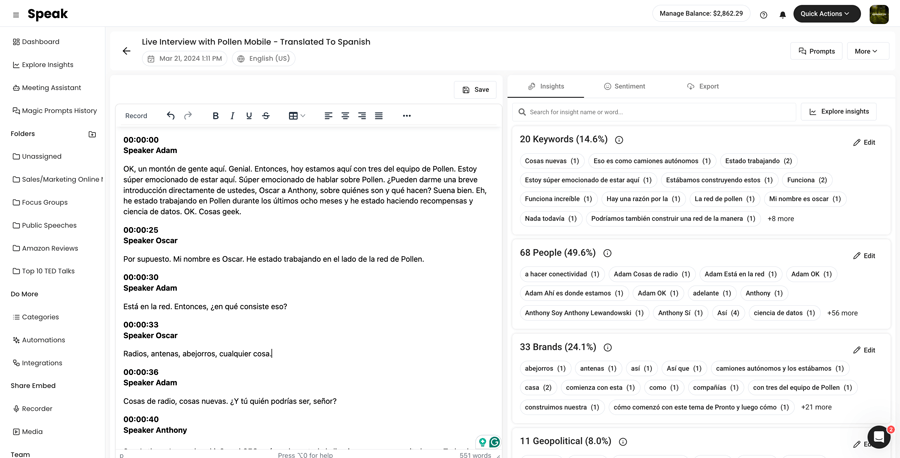How To Translate German to Hebrew
Translating German to Hebrew is super simple!

Step 1: Register for Speak
Register for Speak using this link.
Once you register, you can instantly begin translating your German to Hebrew file(s).

Step 2: Upload Your German file(s)
As soon as you log in, you will be redirected to the dashboard.
Once there, you can select the Quick Action "New Upload".
In Speak, you can seamlessly upload, transcribe and translate audio, video and text files all at once!

Step 3: Translate Your German file(s) to Hebrew
Once the file is uploaded, simply visit your file and select "Translate".
If it is an audio and video file, Speak will ask you if you want to keep the speaker names and timestamps in the translation.
Want to translate many files at once? No problem!
You can view the files you want to automatically translate from German to Hebrew from the folder level and instantly translate as many files as you need with our artificial intelligence translation in just a few clicks.

Step 4: That's It! View, Analyze, Modify & Export Your New Hebrew file(s)
Once the translation is done, you will be alerted and you will see a new document in the same folder your original file is in.
The file will be named the same but with a dash indicating that it is the translated version.
Need support with your German translation?
We are always here and happy to help at Speak!
Just send us a message on live chat on the bottom right corner and we will ensure you are set up for success.
Interested in translating German or other languages to different languages? View our entire list of supported translation languages here.
Automatic, accurate, instant AI translation from German to Hebrew is here for you.
Register for Speak using this link and begin translating German to Hebrew today.
Unlocking New Horizons: Translate German to Hebrew with Cutting-Edge AI
Welcome to an exciting journey where language barriers are broken down, connecting cultures and enhancing communication like never before. The world is becoming increasingly globalized, and the need for efficient, accurate translation between languages such as German and Hebrew has never been more critical. Speak AI is at the forefront of this transformation, leveraging advanced Natural Language Processing (NLP), Generative AI, and data visualization to deliver seamless translation experiences. Dive into the realm of ai translation and discover the myriad ways in which automatic translation is revolutionizing the fields of research and business.
Why Translate German to Hebrew?
With the rise of global communication, the ability to translate between German and Hebrew efficiently opens doors to immense opportunities. Whether it's for academic research, business expansion, or personal growth, translation powers connectivity and understanding. Speak AI's cutting-edge software, empowered with AI Meeting Assistant capabilities, enriches this experience, making translations more accessible than ever.
The Value of Automatic Translation
The evolution from traditional translation methods to automated, AI-powered solutions has brought about a revolution in how we approach language conversion. Automatic translation, particularly between languages such as German and Hebrew, offers unparalleled benefits:
- Time and Cost Savings: Streamline the translation process, drastically reducing the time and financial resources required.
- Accuracy and Consistency: AI models ensure translations maintain high accuracy and consistency, even in specialized fields.
- Scalability: From single documents to large-scale projects, automatic translation can handle varying volumes with ease.
Empowering Researchers and Businesses
For researchers delving into German and Hebrew documents, automatic translation accelerates knowledge acquisition and fosters international collaboration. Businesses, on the other hand, can tap into new markets and cultivate stronger, culturally sensitive relationships with their clientele. Speak AI's technology, with a commendable 4.9 rating on G2 and over 150K users, is a testament to the transformative impact of AI in translation.
Exploring German and Hebrew: A Rich Tapestry of Linguistic Heritage
Understanding the landscape in which German and Hebrew thrive enriches our appreciation of the need for effective translation solutions.
Geographical and Demographic Footprint
German and Hebrew are prominent languages within their respective regions, each with a rich cultural and historical significance. German, widely spoken in Germany, Austria, Switzerland, and parts of Belgium and Luxembourg, boasts over 100 million speakers. Hebrew, revitalized in the late 19th and early 20th centuries, is primarily spoken in Israel by approximately 9 million people.
Historical and Cultural Intersection
Both languages have played pivotal roles in the development of Western thought, literature, and science. The translation between German and Hebrew thus not only facilitates communication but also enables the cross-pollination of ideas and cultural exchange.
German and Hebrew: A Comparison
While German and Hebrew come from distinct linguistic families, their usage in diverse fields presents both challenges and opportunities for translation.
Linguistic Characteristics
German, belonging to the Germanic language family, features a rich system of inflection and a comprehensive set of grammatical rules. Hebrew, a Semitic language, showcases root-pattern morphology, where word formation centers around triliteral roots. This fundamental difference poses unique challenges in translating nuances and context accurately.
Fun Facts: Celebrating Linguistic Diversity
German boasts the longest word published in the Duden, the official German dictionary, while Hebrew's revival as a spoken language after nearly two millennia is a testament to linguistic resilience and evolution.
Cultural Exchange and Mutual Influence
Over the years, German and Hebrew have influenced each other through literature, philosophy, and science, enriching both languages and cultures. The translation fosters this ongoing dialogue, contributing to a deeper mutual understanding.
Speak AI: Your Gateway to Seamless German to Hebrew Translation
At Speak AI, we understand the importance of breaking down linguistic barriers to foster global communication and collaboration. Our suite of AI-powered translation tools, including an AI Meeting Assistant that seamlessly integrates with major platforms like Microsoft Teams, Zoom, Google Meet, and Webex, offers a revolutionary approach to translating audio, video, and text from German to Hebrew.
With Speak AI, experience the benefits of automatic translation, tailor-made for the needs of researchers, businesses, and curious minds alike. Our software's integration of NLP, large language models, and data visualization transforms the translation process into a swift, accurate, and insightful journey.
Join our community of over 150,000 users and embark on a linguistic adventure that bridges continents, cultures, and hearts. Experience the power of AI in unlocking the full potential of German to Hebrew translation, and witness the world open up in ways you never imagined.
Ready to explore the limitless possibilities of automatic translation? Sign up for Speak AI today and take the first step towards a more connected, understood world.
Conclusion
The journey from German to Hebrew, empowered by the latest advancements in AI and automatic translation, represents more than just the transfer of words. It's about connecting histories, cultures, and ideas, fostering a global community where communication knows no bounds. Speak AI is not just a tool but a bridge to a world where language barriers cease to exist, and mutual understanding flourishes.
Embrace the future of translation with Speak AI and transform the way you communicate, research, and do business. Together, let's make the world a little smaller, one translation at a time.
---
Frequently Asked Questions
What Locations are German and Hebrew Popular?
German is predominantly spoken in Central Europe, especially in Germany, Austria, and parts of Switzerland, Belgium, and Luxembourg. Hebrew, meanwhile, finds its stronghold in Israel, acting as the primary language for around 9 million people.
What are Some Fun Facts About German and Hebrew?
German has the record for some of the longest words in the world due to its compound word formations. Hebrew, on the other hand, has the unique distinction of being a dead language that was revived and is now thriving.
What are the Differences and Similarities Between German and Hebrew?
While German and Hebrew stem from different linguistic families, both have rich literary and scientific traditions that contribute markedly to their spheres of influence. Their distinct grammatical structures and morphologies present fascinating challenges and opportunities in translation.
Translate German To These Other Supported Languages:
- Translate German-to-Arabic (Egypt)
- Translate German-to-Arabic (Iraq)
- Translate German-to-Arabic (Israel)
- Translate German-to-Arabic (Jordan)
- Translate German-to-Arabic (Kuwait)
- Translate German-to-Arabic (Lebanon)
- Translate German-to-Arabic (Oman)
- Translate German-to-Arabic (Palestinian Authority)
- Translate German-to-Arabic (Qatar)
- Translate German-to-Arabic (Saudi Arabia)
- Translate German-to-Arabic (Syrian Arab Republic)
- Translate German-to-Arabic (United Arab Emirates)
- Translate German-to-Arabic Modern Standard (Bahrain)
- Translate German-to-Armenian
- Translate German-to-Bulgarian
- Translate German-to-Catalan
- Translate German-to-Chinese (Cantonese, Traditional)
- Translate German-to-Chinese (Simplified)
- Translate German-to-Chinese (Traditional)
- Translate German-to-Croatian
- Translate German-to-Czech
- Translate German-to-Danish
- Translate German-to-Dutch
- Translate German-to-English
- Translate German-to-English (Australia)
- Translate German-to-English (India)
- Translate German-to-English (Ireland)
- Translate German-to-English (New Zealand)
- Translate German-to-English (Scottish)
- Translate German-to-English (South African)
- Translate German-to-English (United Kingdom)
- Translate German-to-English (United States)
- Translate German-to-Estonian
- Translate German-to-Farsi
- Translate German-to-Finnish
- Translate German-to-French
- Translate German-to-French (Canada)
- Translate German-to-German
- Translate German-to-German (Swiss)
- Translate German-to-Greek
- Translate German-to-Gujarati
- Translate German-to-Hebrew
- Translate German-to-Hindi
- Translate German-to-Hungarian
- Translate German-to-Icelandic
- Translate German-to-Indonesian
- Translate German-to-Irish
- Translate German-to-Italian
- Translate German-to-Japanese
- Translate German-to-Kannada
- Translate German-to-Korean
- Translate German-to-Latvian
- Translate German-to-Lithuanian
- Translate German-to-Malay
- Translate German-to-Malayalam
- Translate German-to-Norwegian
- Translate German-to-Persian
- Translate German-to-Polish
- Translate German-to-Portuguese
- Translate German-to-Portuguese (Brazilian)
- Translate German-to-Portuguese (Portugal)
- Translate German-to-Romanian
- Translate German-to-Russian
- Translate German-to-Slovak
- Translate German-to-Slovenian
- Translate German-to-Spanish
- Translate German-to-Spanish (Mexico)
- Translate German-to-Swedish
- Translate German-to-Tamil
- Translate German-to-Telugu
- Translate German-to-Thai
- Translate German-to-Turkish
- Translate German-to-Ukrainian
- Translate German-to-Vietnamese



